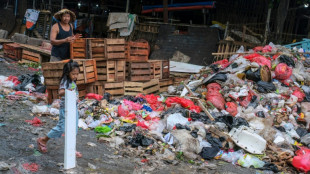
-
 Williams 'on the back foot' after missing Barcelona: Albon
Williams 'on the back foot' after missing Barcelona: Albon
-
Real Madrid submit evidence to UEFA in Vinicius racism probe

-
 Olympics rev up Milan's renewal but locals fear price to pay
Olympics rev up Milan's renewal but locals fear price to pay
-
Cardona Coll, Fatton win Olympic-debuting ski mountaineering sprint golds

-
 MSF will keep operating in Gaza 'as long as we can': mission head
MSF will keep operating in Gaza 'as long as we can': mission head
-
Russian Filippov wins first medal at Milan-Cortina Games for individual neutral athletes

-
 Italian Milan takes sprint honours at UAE Tour
Italian Milan takes sprint honours at UAE Tour
-
Dozens killed in jihadist attacks in northwest Nigeria

-
 Zimbabwe unbeaten in T20 World Cup after six-wicket Sri Lanka win
Zimbabwe unbeaten in T20 World Cup after six-wicket Sri Lanka win
-
Postecoglou admits taking Nottingham Forest post a 'bad decision'

-
 Switzerland's Fatton wins women's ski mountaineering sprint on Olympic debut
Switzerland's Fatton wins women's ski mountaineering sprint on Olympic debut
-
Kinghorn, Van der Merwe return for Scotland against Six Nations strugglers Wales

-
 Repsol says could boost Venezuela oil output over 50% in 12 months
Repsol says could boost Venezuela oil output over 50% in 12 months
-
UN says Israeli actions raise 'ethnic cleansing' fears in West Bank, Gaza

-
 Arteta tells faltering leaders Arsenal to harness Wolves 'pain' against Spurs
Arteta tells faltering leaders Arsenal to harness Wolves 'pain' against Spurs
-
Crowley gets nod for Irish as Prendergast drops out

-
 Unbeaten Swiss to meet Great Britain in Olympic men's curling semis
Unbeaten Swiss to meet Great Britain in Olympic men's curling semis
-
UK police arrest ex-prince Andrew on suspicion of misconduct

-
 Oil extends gains on US-Iran tensions, Europe stocks slide
Oil extends gains on US-Iran tensions, Europe stocks slide
-
Former prince Andrew, a historic downfall

-
 Sri Lanka post 178-7 against Zimbabwe ahead of T20 Super Eights
Sri Lanka post 178-7 against Zimbabwe ahead of T20 Super Eights
-
OpenAI's Altman tells leaders regulation 'urgently' needed
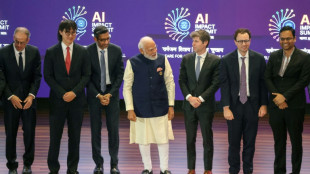
-
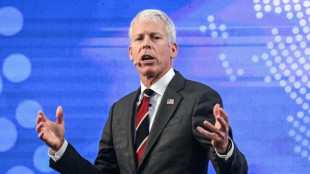 US renews threat to leave IEA
US renews threat to leave IEA
-
Liverpool boss Slot says Isak in 'final stages of rehab'

-
 Airbus ready to build two new European fighter jets if 'customers' ask
Airbus ready to build two new European fighter jets if 'customers' ask
-
UN Sudan probe finds 'hallmarks of genocide' in El-Fasher
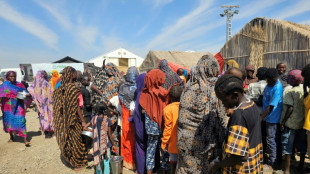
-
 Costelow starts, Hamer-Webb makes Wales debut in Six Nations clash with Scotland
Costelow starts, Hamer-Webb makes Wales debut in Six Nations clash with Scotland
-
Facing US warnings, Iran defends right to nuclear enrichment

-
 Ex-South Korea leader Yoon gets life in prison for insurrection
Ex-South Korea leader Yoon gets life in prison for insurrection
-
OpenAI's Altman says at India summit regulation 'urgently' needed
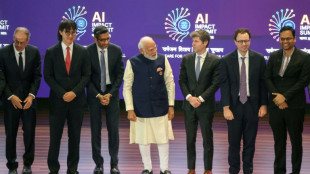
-
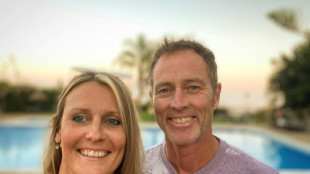 British couple held in Iran sentenced to 10 years
British couple held in Iran sentenced to 10 years
-
West Indies ease past Italy to tune up for T20 Super Eights

-
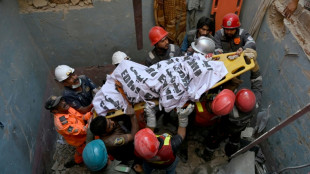 At least 16 killed after building collapses in Pakistan following blast
At least 16 killed after building collapses in Pakistan following blast
-
Summit photo op fails to unite AI startup rivals
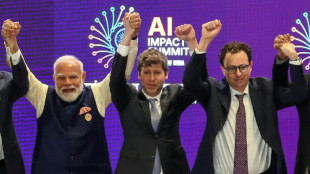
-
 OpenAI's Altman says world 'urgently' needs AI regulation
OpenAI's Altman says world 'urgently' needs AI regulation
-
Horror comics boom in our age of anxiety

-
 Turkey fires up coal pollution even as it hosts COP31
Turkey fires up coal pollution even as it hosts COP31
-
London fashion week opens with tribute to one of its greats

-
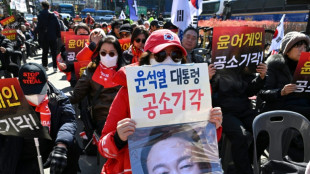 Ex-S.Korea leader Yoon gets life in prison for insurrection
Ex-S.Korea leader Yoon gets life in prison for insurrection
-
Pea soup, veggie mash contest warms up Dutch winter

-
 South Korea's Yoon: from rising star to jailed ex-president
South Korea's Yoon: from rising star to jailed ex-president
-
Private companies seek to import fuel amid Cuban energy crisis

-
 India search for 'perfect game' as South Africa loom in Super Eights
India search for 'perfect game' as South Africa loom in Super Eights
-
India's Modi calls for inclusive tech at AI summit
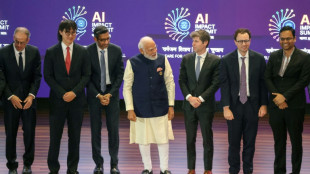
-
 Airbus planning record commercial aircraft deliveries in 2026
Airbus planning record commercial aircraft deliveries in 2026
-
Elections under fire: Colombia endures deadliest campaign in decades
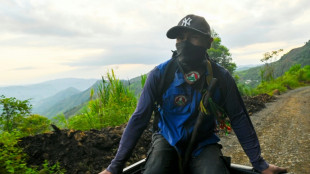
-
 Traore backs 'hungry' Italy against France in Six Nations
Traore backs 'hungry' Italy against France in Six Nations
-
All-rounder Curran brings stuttering England to life at the death

-
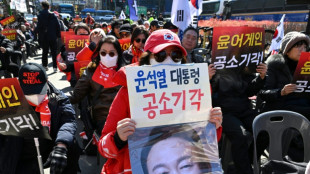 South Korea court weighs death sentence for ex-president Yoon
South Korea court weighs death sentence for ex-president Yoon
-
Tech chiefs address India AI summit as Gates cancels


Will big biodiversity ambitions be enough to save nature?
After the world missed almost all of its targets to protect fast-dwindling nature for the last decade, observers following a new round of negotiations are focusing as much on how goals will be put in place as the headline targets.
Nearly 200 nations are taking part in talks until Tuesday, aimed at fine-tuning a draft text to preserve biodiversity by 2050, with key milestones at 2030, which will be adopted at the United Nations COP15 conference later this year.
Countries are striving to increase their ambitions in the face of stark warnings that humanity is driving devastating declines in the biodiversity that supports all life on the planet.
But the world failed almost entirely to reach a similar set of 10-year objectives set a decade ago at UN talks in Aichi, Japan.
"The Aichi targets were largely missed because of lack of political will and parties not prioritising them enough," said AFP Anna Heslop, of the NGO ClientEarth, which is following the Geneva talks.
"There was just a lack of implementation. We can't afford to be in that position again in 10 years."
The text under negotiation includes a series of proposals to avoid repeating the same mistakes.
"What we need is a better system for encouraging parties to plan and report, and then the global community needs to do something. It is keeping these three elements is the challenge," said a delegate from a Global North country, who asked not to be named.
- Progress reports -
Member countries should develop stronger action plans to use natural resources sustainably, said the IDDRI think tank said to be more effective.
There should also be a more robust reporting system, with countries periodically measuring progress and passing on data that feeds into a global assessment, it added.
Currently, each country draws up its national biodiversity plan on a different basis, making comparisons difficult.
To address this, the delegations in Geneva are trying to develop common indicators to measure progress.
"Let's put in place mechanisms for collective and individual review, which will increase the pressure and this affects ambitions and implementation at the national level," said Juliette Landry, researcher at IDDRI.
Experts and conservation groups want national action plans to be updated regularly after COP15 with progress reports and a global stocktake before 2030.
That way, nations and the international community can see if they are going off track and increase their efforts.
But more reporting and administration requires more funding, and biodiversity-rich developing countries stress they will need both financial and technological support to meet these obligations.
"You cannot ask people to do spatial planning if they don't have the means," said a delegate from the Global South.
Another IDDRI proposal is the creation of a compliance mechanism, although Landry stressed that this would not be an exercise in finger-pointing.
Instead she said it would show the "gaps between what the countries had planned and what they implemented" and enable problems to be addressed and for countries to share their experiences, she said. So far, there has been little appetite for such a mechanism.
But without one "all of this process is meaningless" said Oscar Soria, of the advocacy group Avaaz.
"Because nobody will take responsibility and nobody will take the convention seriously from the outside," he said.
P.Mathewson--AMWN



